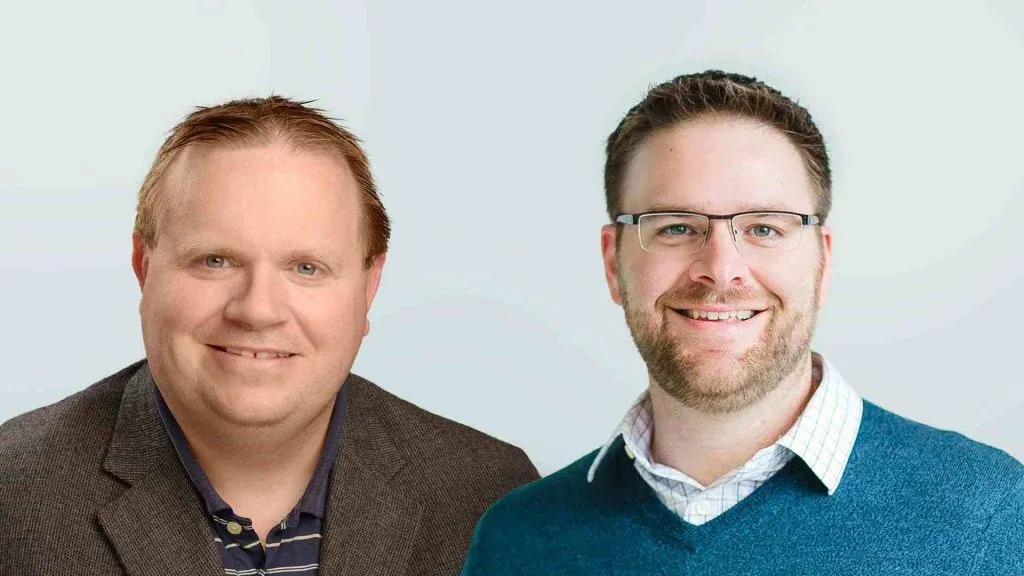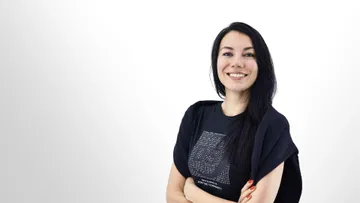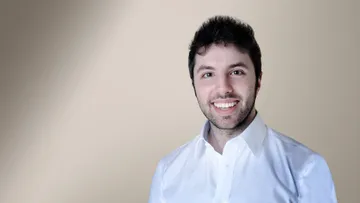Dave Mathias and Matt Jesser,
Founders of Beyond the Data
Hey, guys. We’re glad you agreed to be our interview guests. Could you briefly introduce yourselves to our readers?
Matt: Hi, my name is Matt Jesser. I’ve worked in analytics for nearly 15 years. Starting out as a consultant for HR analytics, I quickly learned the importance of the “soft skills” that make analytics truly successful. I’ve since worked at Fortune 500s like Target Corporation and Supervalu, leading analytics teams and delivering data science solutions that drove tangible business outcomes.
Dave: I’m Dave Mathias. Thanks for having us here. First off, I don’t have the traditional data science background, although I’m not sure what exactly that would be, but I do have an eclectic background that some find interesting. I identify myself as a recovering organic chemist and attorney that got into product and innovation.
Over the years, I’ve worked at several big companies like Aon, U.S. Bank, and Solera, and at a couple of small companies, as well. My work there has been focused around product management and innovation where analytics plays a role. Some people say they seek work-life balance but mine is better described as work-life busyness. It’s what I enjoy. My passions include getting involved in many communities (yes, I’m a member of 96 MeetUp groups) and love learning but I also love giving back.
Although you have distinct backgrounds, you are both successful in your area of expertise. How did you find common ground and start working together?
Matt: Well, Dave and I met over a shared interest in solving the one thing that Data Scientists don’t have control over… Other people’s decisions and behaviors. Even creating the most advanced and accurate algorithm in the world won’t help if your business teams can’t or won’t use it to change their day-to-day jobs.
Dave: Yeah, we both had been in the Twin Cities analytics community for a number of years but didn’t formally know each other until a friend suggested we meet – thank you April! Matt and I hit it off right away. Eventually, our shared interest and belief of the need to level-up the business to show real analytics value led to us working together. That’s how Beyond the Data was born.
A friendship at first sight - it seems April knew that great minds think alike, even before you two did. Now, you know data science became quite popular relatively recently. Could you share with us when you first heard about the field and how you ended up working in it?
Matt: Yeah, of course. To tell you the truth, my career has always been around data. My work experience involves cleaning & prepping data, analyzing, interpreting, visualizing and storytelling around data. Actually, I discovered Tableau and data visualization principles right around the time that the term “data science” came into prominence. For me, it sparked my curiosity to explore the technical side of analytics. So, I picked up SQL, Python, R to round out my Tableau and Excel skills. Despite my technical ability, my passion is still around the soft-side of the data science equation, turning those technical tools into real ROI for the business teams I support.
Dave: Well, I’m not sure specifically when exactly I heard the term data science. However, I was with a company called Benfield (now part of Aon) when I started working in what people would term “data science”. At the time, I was on the business die. We were working on a casualty catastrophe model with casualty risk that would allow for better risk pricing of liabilities. We thought it would provide a better market for our company to broker complicated casualty transactions because risk would be better agreed upon by the parties.
…And the rest is history. Now, let’s talk about your shared project. You are the founders of Beyond the Data. Could you tell us a bit more about it?
Matt: Absolutely. Beyond the Data is an assessment and training company, focused on helping business teams get more value from their data and analytics teams. We do this by training the non-analyst teams on the basics of data and analytics. Better questions from the business teams, and more support & adoption from those business teams will create far more ROI than simply delivering data science as a black box solution.
Dave: Generally, we are focused on helping business teams and leaders get more value out of data. Sure, there are a lot of companies that focus on helping analytics teams do better analytics. However, there aren’t many companies focused on helping business teams and leaders level-up around data. That is where we saw a need and where we focus our efforts. We offer solutions around data literacy training and assessment. We also help organizations build a sustainable data culture through a combined bottom-up and top-down approach.
You really seem to know your business well. We’re sure our readers would like to find out more about your work. For example, what methods do you use to help high-performing people become change-agents who can move their organizations to a more data-informed approach?
Matt: That’s an interesting question. Today, many organizations say they want to be “data-driven”. But how does that happen? Well, a top-down approach is certainly a part of it. You need executives who are invested in the idea of using data to inform better decisions. But we also believe it’s equally important to build a grass-roots “bottom-up” approach.
Dave: And we do this by empowering non-technical Data Champions directly into different business lines. They are the change agents who see the power of data and have the respect and trust of their peers. They know how to ask the right questions, how to leverage the data science teams, and tell stories about the wins their team get from data science.
That sounds like an efficient strategy. What other creative ways do you use to differentiate your business from others?
Matt: For starters, our focus on reducing and bridging the data literacy gap is definitely a differentiator. However, as a scrappy startup that preaches the need for a bottom-up approach to data culture as necessary for organizations, we do just that. We incorporate change management, design thinking, behavioral science, and organizational development to provide sustaining change.
Dave: Another differentiator has been participating in and adding value to what we call the Data Champion community. These are people that are far from average in their capabilities. It could be an HR generalist, a financial analyst, or a claims manager that all are seeking to better leverage data in their job and at same time help their culture be more supportive of data. This is our tribe and our goal is to listen and solve problems that help this tribe be more successful.
Matt: However, we know that sustainable change requires both a top-down and bottom-up approach. So, at same time, we apply these concepts to leaders, too. We focus on speaking the language leaders are familiar with. All too often, people think of data science and look to center on efficiencies to cut head count. Instead, we think data literacy can be harnessed by all people, so they could be better at what they do. For instance, if you’re project manager you can be a more prominent project manager. If you’re a financial analyst, you can become an exceptional financial analyst.
I can tell you care about what you do. Using your expertise to help the data science community thrive is certainly notable. Now, tell us more about your podcast journey. Data science podcasts seem to have exploded in popularity. Why did you decide to start your own ‘Data Able’ podcast?
Matt: Well, Dave and I believe that part of solving the gap in this growing data literacy field is exploring what it really means, what it looks like in practice and what value organizations get from it. So, we decided to start the “Data Able Podcast”. It is our way to explore these ideas and learn from other leaders and organizations in the field, as they take their own data literacy journey. In a lot of ways, the podcast helps us learn from other amazing people in this space. The benefit is that we get to share a lot of those learnings with our podcast listeners. And that’s been a lot of fun.
Dave: There are a lot of great data science podcasts out there that Matt and I have and do listen, but most seemed to be focused around the technical side of data science. We find the latest algorithms, tools, and techniques interesting, but we just thought there was a gap. We thought there needs to be more discussion around getting value out of data. Plus, since Matt and I are both fans of podcasts, we thought: “Wouldn’t it be fun to start one ourselves?”. We weren’t sure what it was going to end up like, but we believed it would be a fun ride to get on. Right now, we are on that ride and we are very much enjoying talking to interesting and awesome people.
That’s such a be-in-the-moment way to look at projects. But there must be some serious work involved, as well. What's the biggest challenge specific to putting together a new episode of Data Able?
Matt: I’m not sure about any specific challenges, but I will tell you what I THOUGHT was going to be a challenge. In the early going, I expected to have a hard time getting people on the show for interviews. We were a new startup podcast, and people are so busy. Why would anyone want to take the time to star on our show? It turns out that people are far more gracious and generous with their time than I’ve ever expected! We’ve even had people reach out to US to get on the show. I’ve been humbled by our amazing guest’s willingness to share their time and their expertise with our listeners.
Dave: In my opinion, the biggest challenge is to manage to get entertaining but also insightful guests that have diverse perspectives to share. Lucky for me, Matt has been doing more of the heavy lifting of production.
You’ve been doing a remarkable job so far. How do you choose the topics for your podcasts?
Matt: At the heart of everything we do, is looking for stories around the soft side of data. In particular, how people are using data to drive real decisions and actions. According to several research groups, data science has a failure rate of over 80%. We want to find the people who are succeeding despite the overwhelming odds, and we want to learn from people who have failed so we can all get better, together.
Dave: Also, we choose our podcast topics from the problems we have experienced when we were working in companies and from listening to our clients now. Our problem focus is around the softer side of data science problems, but these problems can oftentimes be the hardest to solve. Sometimes we even get our audience to reach out and make topic suggestions and we love that.
You feature guests with very interesting backgrounds. What criteria do you use to choose them? And what can we expect from the upcoming podcast episodes?
Matt: When it comes to criteria, there is no one “right way” to get into data science or to be a data scientist. We all have journeys and we’re all learning and growing together. We’re looking for these kinds of people at the edges of data – the ones doing interesting and meaningful work. We want to capture their stories and show the community what data science really looks like.
Dave: I think your lead in comment says it all. We look for interesting people that either we know or want to know. One of the nice things about a podcast is that it gives an opportunity to have a conversation. While we have the theme around “data”, we aim to have our guests’ personalities shine.
And it’s exactly the person-oriented attitude, along with the valuable insights your guests provide, that makes your podcast stand out. Now, we usually finish our interviews with some nerdery. What is the one nerdy thing you would like to share with the world? It doesn’t have to be data science related.
Matt: Honestly, I have too many nerdy things to fit in a single interview. But in the spirit of “soft-skills” in analytics, I would encourage people to explore ways to round out their skills by learning things like storytelling, argument & debate, creative thinking, and improvisational skills. I can think of no better way to practice all these skills than getting involved in a game of Dungeons and Dragons or similar role-playing game. It’s fun, creative, forces storytelling and creativity, nerdy as can be, but also helps you become a more well-rounded person.
Dave: Per Statista the country that had the highest percentage of population listen to the podcast in the last month is South Korea with 58% of it population doing so. As a couple other reference points this figure was 33% for the United States and 22% for Germany. Nerdiness aside, podcasting is definitely gaining in popularity, but still has a long way to go. Nevertheless, it is a great way to share and find additional information easily, be it data science related or not.
Matt, Dave, thank you for this conversation! You helped shed light on the importance of soft skills and community in data science. What’s more, our readers will learn a lot from your balanced approach to data science projects. We’re looking forward to Data Able’s new episodes and wish you success in the future!






